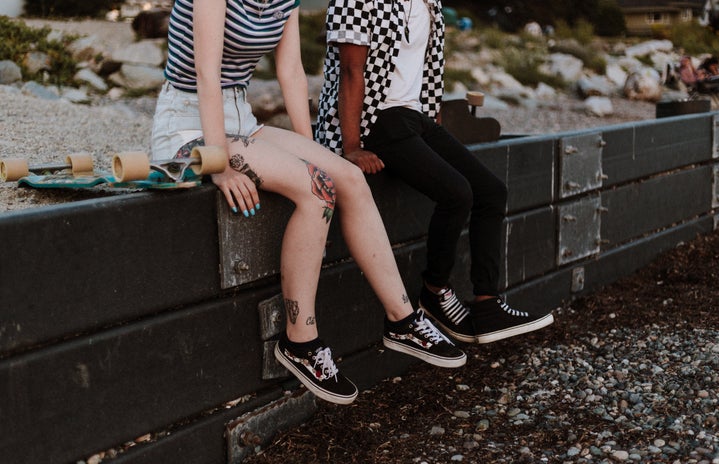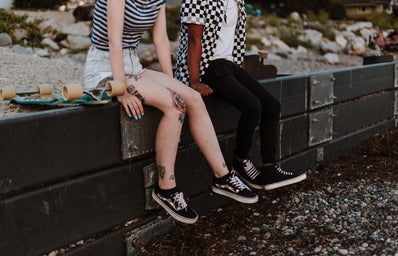In a modern world ruled by technology, it’s no wonder that so many collegiettes are meeting boyfriends on the Internet. Many people have met guys on online dating sites, where they flirted, chatted and started dating in real life. But what about people who choose to pursue an entire relationship online without any in-person contact?
Is a completely online relationship even possible, and what are the risks? We talked to relationship and love expert Laurie Davis, founder of online dating coaching website eFlirt Expert and author of Love @ First Click: The Ultimate Guide to Online Dating, and surveyed more than 50 college women to figure out the pros and cons of pursuing a relationship where you rarely (if ever) meet face to face.
The Cons of Online Relationships
Fear of Being “Catfished”
More than 30 of our anonymous respondents pointed out one of the most obvious problems with exclusively online relationships: “catfishing.” Nev Schulman coined the term when he created Catfish, a documentary about pursuing an online relationship with a girl who he didn’t know didn’t really exist. He later created a show on MTV where he helps people find out if they’re being lied to on the Internet.
But what is a “Catfish,” exactly? It refers to someone online who is being dishonest about who they really are, keeping people constantly on their toes (much like an actual catfish). This can range from lying about small personal details to creating an entire online persona that doesn’t really exist. Think about it: How scary would it be to realize that someone you’ve been spilling your personal story to has been completely lying about their own?
Megan*, one of our survey responders who has experimented with forming friendships online, says there are trust issues that can form with a relationship on the Internet. “You can never be one hundred percent sure that a person you met online is who they say they are,” she says. “In fact, most people lie about themselves, to some extent, while chatting online with those they don’t know.” People try to seem more likable on the Internet, and the line between what is fact and what is fiction can become extremely blurred.
Rachel* points out that you should also think about what type of person would ask you to pursue a solely online relationship in the first place. “One might start to wonder why this person prefers not meeting up in the real world,” she says. “Are they socially inept? Why can’t they find someone to date in the flesh?”
Lack of Intimacy
A relationship that is solely online would lose the intimacy aspect of dating. Is it possible to be romantic in cyberspace? One survey taker, Julie*, discusses says she is in a long-distance relationship, and multiple levels of intimacy are compromised. “You lose some of the intimacy in the relationship when it’s long distance,” she says. “Not just in a sexual sense, but you lose some of the closeness.”
Love expert Laurie Davis echoes these sentiments. “Online romances simply can’t flourish the same without the offline element,” she says. “You may be able to connect by being emotionally vulnerable with one another via text, GChat, email and phone, but without the important physical elements, like touch, it will always feel like something is missing.”
Survey responders also mentioned that intimacy doesn’t just come from sex—it’s about the other fun parts of a relationship, too! Gabrielle* says that one of her favorite things to do with her boyfriend is to get dressed up and go out to a fancy restaurant a couple times per month, and she would miss those dates if she was in an online relationship.
It’s Stigmatized
Abby Hargreaves, a senior at Hollins University, is in a long-distance relationship with a boy she met online. She finally met him after a month and a half of dating on the Internet. Abby understands that there can be a lot of stigma around meeting significant others online. She and her now-boyfriend met on Omegle, a website that allows strangers to chat one-one-one with each other, and she sees how that can be hard to explain to people.
Abby felt like she had to be careful and thoughtful at first when letting people know about her cyber boyfriend. “I told people slowly about my relationship,” she says. “I started with my closest friends, then family, then less-close friends. Now, I’m very open about talking about how we met.” While Abby’s friends and family accepted and supported her unconventional relationship, other collegiettes might not be as lucky.
[pagebreak]
The Pros of Online Relationships
You Can Have “Me” Time
Abby says that one of the biggest advantages to starting her relationship online is that it gave her boyfriend and her a chance to have lives outside of their relationship. “Because we’re both introverts, online dating can be kind of convenient because it’s easier to get away from your significant other and have some ‘me’ time,” she says.
Many collegiettes believe that independence could be one giant advantage of a relationship online in addition to finding someone you might not normally get to meet if you were to stick with people you hang out with on a regular basis. Are you a busy collegiette on the go? It’s much easier to fit in some time online than to have to meet up with someone!
Distance Isn’t Always a Bad Thing
Abby has found that her relationship has been strengthened in some respects due to the distance component. “Long distance has definitely been a challenge for us both, but it’s also kind of a blessing,” she says. “Absence makes the heart grow fonder and all of that. We write letters to each other frequently, send presents with online shopping and visit each other when we can.” There’s definitely some room for romance!
Abby has also seen that this distance from being mostly online has added more trust to her relationship. “Obviously a lot of trust is important in relationships like this,” she says. “I can’t be with him 24/7 and he can’t with me, either, so we both just have to have faith in each other, our relationship, and ourselves.”
Proceed With Caution
Overall, of the 50+ collegiettes surveyed, the majority had issues with relationships based solely on the Internet. Most warned other collegiettes to proceed with caution when trying out a romance that isn’t face-to-face. “I think there are no pros of being in a solely online relationship. A relationship like that is unhealthy and potentially very dangerous for both parties,” Katie* says.
Another responder, Lauren*, thinks that it’s totally okay to meet someone online; after all, online dating is a more normal occurrence today! However, if the relationship starts to get serious, she doesn’t think you should keep the connection solely in cyberspace. “Online relationships should never get serious without meeting the person first,” she says. “If you meet your boyfriend online, that’s fine, but you shouldn’t say that you’re officially dating until you’ve met in person.”
If you’re in the midst of an online relationship and aren’t sure how to take it to the face-to-face level, Davis has advice for you! “If you communicate virtually for too long, finally meeting in person might feel unfulfilling because while your relationship is fundamentally advanced, your body language is on a major delay,” she says.
Davis reminds collegiettes that the point of meeting someone online is to take it offline as quickly as possible and to give your suitor a chance. “Give the transition to face-to-face some time and try not to make judgment on chemistry when you first meet up. Physical sparks take time to burst into fireworks!” she says.
And how does Abby feel having been in an online relationship herself? “The stigma around online dating is starting to diminish so it’s not such a big deal anymore. I like to see myself as a kind of advocate for non-traditional dating,” she says. “As long as it’s healthy and both parties are happy, I don’t see why others should condemn it.”
Everyone has different types of relationships; just make sure you are being safe and healthy about it!
*Names have been changed.

